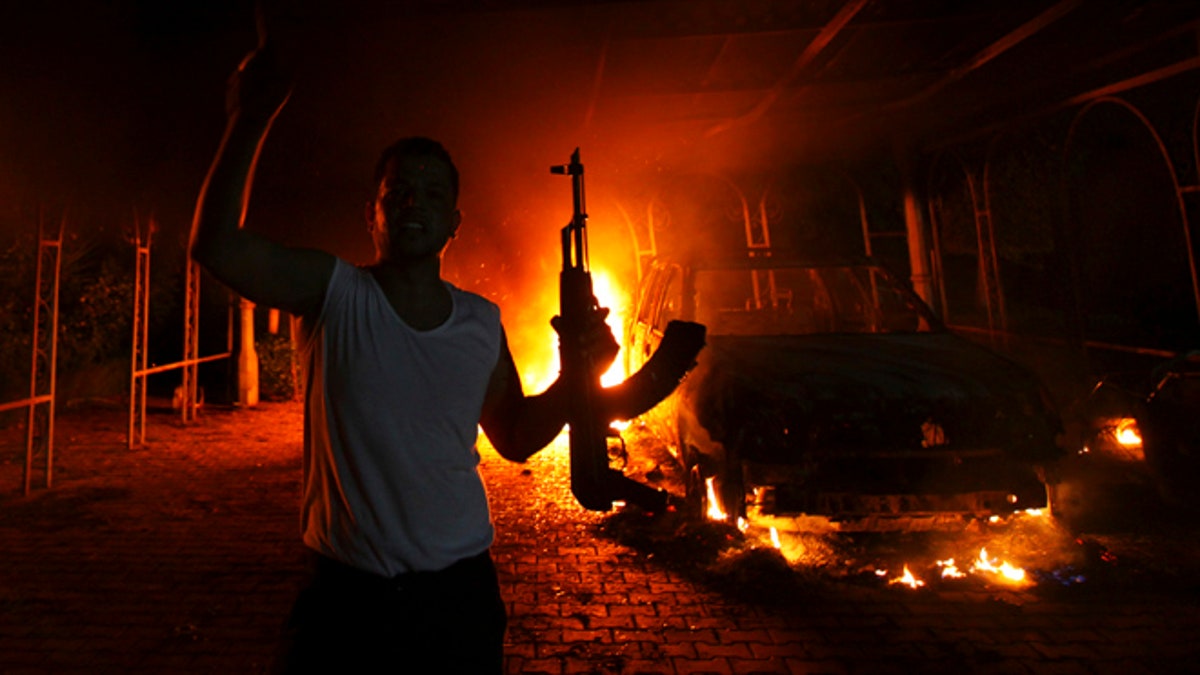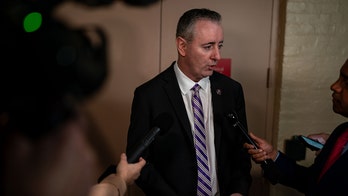
Sept. 11, 2012: A protester reacts as the U.S. Consulate in Benghazi is seen in flames during a protest by an armed group.
Former Secretary of State Hillary Clinton has called the Benghazi terrorist attack -- which killed Ambassador Chris Stevens, foreign service officer Sean Smith, and CIA contractors Ty Woods and Glenn Doherty -- the most significant failure on her watch.
In a question and answer session at Simmons College Wednesday night, Clinton listed the terrorist assault on the diplomatic compound in eastern Libya as her “biggest regret.”
"It would certainly be the attack on our facility in Benghazi, and the loss of, uh, two State Department personnel and two CIA contractors from the terrorist attack and the terrible consequences of that," she said.
"It's very, very painful and it was certainly the biggest regret that I had as Secretary of State."
While Benghazi's impact on a possible presidential run is unknown, Clinton focused on the emotional toll.
"They weren't the only people that we lost, but we lost them in such a terrible, senseless, terrorist action that, you know, it's just deeply sorrowful and it went on for hours, because the CIA annex was attacked after the State Department facility was attacked," she said of the Sep. 11, 2012 assault.
Her comments stand in sharp contrast to her defiant congressional testimony in January 2013, when she appeared before the Senate Foreign Affairs Committee.
"The fact is we had four dead Americans, was it because of a protest or was it because of guys out for a walk one night who decided that they'd they go kill some Americans? What difference at this point does it make?" she asked.
Those who have followed Benghazi from the day of the attack, including national security correspondent Eli Lake of the Daily Beast, said it was a significant change in tone.
"At the beginning of 2013 when then Secretary of State Hillary Clinton appears before the Senate Foreign Relations Committee, she's feeling beaten up. This has become a major issue, it seems like the Republicans are not going to let it go, and she was combative,"Lake said, adding the contrite statement may be highly effective.
"It almost says, listen I acknowledge it's a mistake, you can go back to this, you don't have to hound me on this point, we regret and I think that, you know, speaks volumes for her."
Now there also is new scrutiny of Clinton's closest associates, including then-U.N. Ambassador Susan Rice, who went on national television five days after the attack and blamed an obscure internet video for the assault. Rice is now the president's national security adviser.
In surprising testimony earlier this month, former deputy CIA director Michael Morell said it was Rice, not the CIA, who connected the video to Benghazi.
"When she talked about the video, my reaction was, that's not something that the analysts have attributed this attack to,"Morell testified.
The flawed video explanation was also cited by Clinton when the remains of the four dead Americans were flown to Joint Base Andrews on Sep.14, 2012.
"This has been a difficult week for the State Department and for our country. We've seen the heavy assault on our post in Benghazi that took the lives of those brave men,” she said. “We've seen rage and violence directed at American embassies over an awful internet video that we had nothing to do with."
When Congress returns next week, Fox News has learned that Republican Senator Lindsey Graham of South Carolina and others in the Senate will push for Rice to fully explain to lawmakers exactly who briefed her in advance of the 2012 talk shows, where she blamed the video for the assault.
Given the CIA was not the source of the video explanation, according to Morell, lawmakers want to know whether State Department or White House personnel were involved in the Rice briefings. Some lawmakers believe it would be difficult for Rice to now assert executive privilege because her old job as U.N. ambassador required Senate confirmation.




